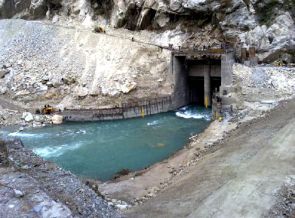 In the first high-level bilateral engagement after the installation of the NDA government, India on Thursday assured Bangladesh that efforts were on to evolve a national consensus on the contentious Teesta river water sharing deal even as it announced easing of visa norms for certain categories of visitors from Bangladesh.
In the first high-level bilateral engagement after the installation of the NDA government, India on Thursday assured Bangladesh that efforts were on to evolve a national consensus on the contentious Teesta river water sharing deal even as it announced easing of visa norms for certain categories of visitors from Bangladesh.
External Affairs Minister Sushma Swaraj, who chose Bangladesh for her first stand-alone foreign visit since assuming office, had "constructive and productive" meetings with top leadership here including Prime Minister Sheikh Hasina besides having detailed discussions with her Bangladeshi counterpart Abul Hassan Mahmood Ali.
Sharing of Teesta river water and the Land Boundary Agreement which was agreed upon by the previous UPA government were high on Bangladesh's agenda during the talks. Bangladeshi side appeared to be satisfied with the discussions on these two issues.
Indian officials said Swaraj told Bangladeshi side that the efforts were on to have a national consensus on Teesta water sharing deal.
Significantly, hours before her departure, Swaraj spoke to West Bengal Chief Minister Mamata Banerjee, whose party Trinamool Congress prevented the previous Congress-led government from signing the Teesta water sharing deal with Bangladesh.
In 2011, Banerjee, then an ally of the Congress-led UPA, backed out from Prime Minister Manmohan Singh's Bangladesh visit, opposing the Teesta water sharing treaty between India and Bangladesh, following which it was shelved.
On LBA, the External Affairs Minister told her counterpart that the matter was before a Parliamentary Committee and will be give "due consideration".
Swaraj, during her call on Hasina, extended invitation from Prime Minister Narendra Modi for her which was accepted by the Bangladeshi prime minister.
During the deliberations, the two sides also talked about extradition of criminals and prisoners in each other's captivity and in this regard, cases of ULFA leader Anoop Chetia and Bangladeshi suspect Nur Hossain, wanted in Bangladesh for killing seven people in Dhaka's satellite city Narayanganj about two months ago were also discussed.
Addressing a press conference after Swaraj's meetings, the Spokesperson in the External Affairs Minister said, "We are not sanctuary for criminals" and if there are any criminals, they will be sent back. He was asked about Bangladesh's demand for Hossain's extradition.
Terming the meetings of Swaraj with Bangladeshi leaders as "constructive, productive and fruitful", the Spokesman said the External Affairs Minister has informed the Bangladeshi side of India's decision to ease tourist visa norms for Bangladeshi nationals under the age of 13 and above 65 years.
They will be now given multiple entry visa for five years instead of one year, he said.
India has also decided to give additional 100 megawatts power to Bangladesh from the gas-based power project at Palatana in Tripura.
Asked if the issue of illegal immigration was discussed, while the Spokesperson said all the "staple" matters were discussed, indicating that India did raise it. But Bangladesh Foreign Minister Ali said, "there was no question raised from Indian side and the matter was not discussed."











 © 2025 Rediff.com -
© 2025 Rediff.com -